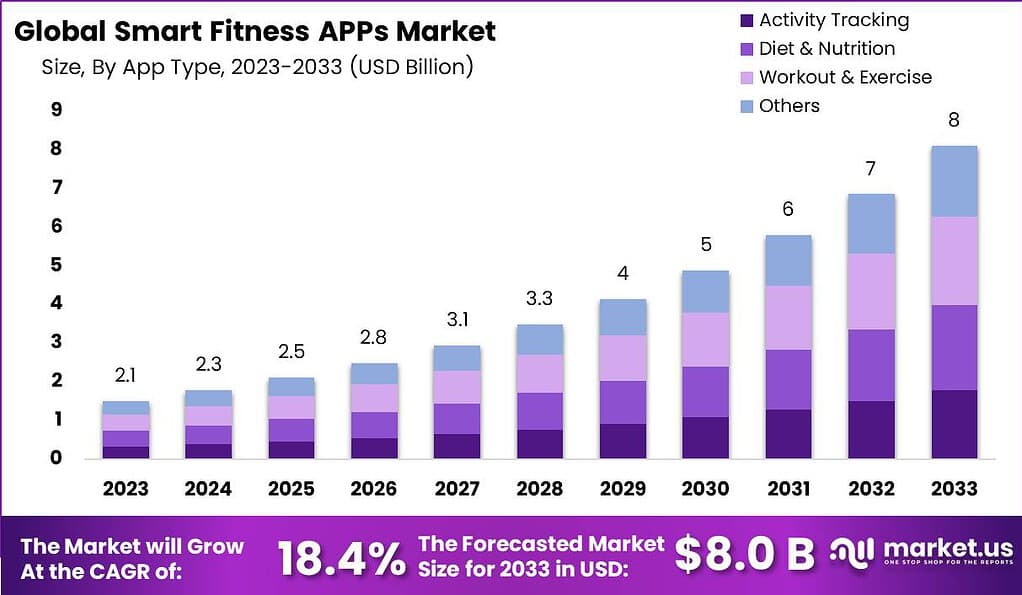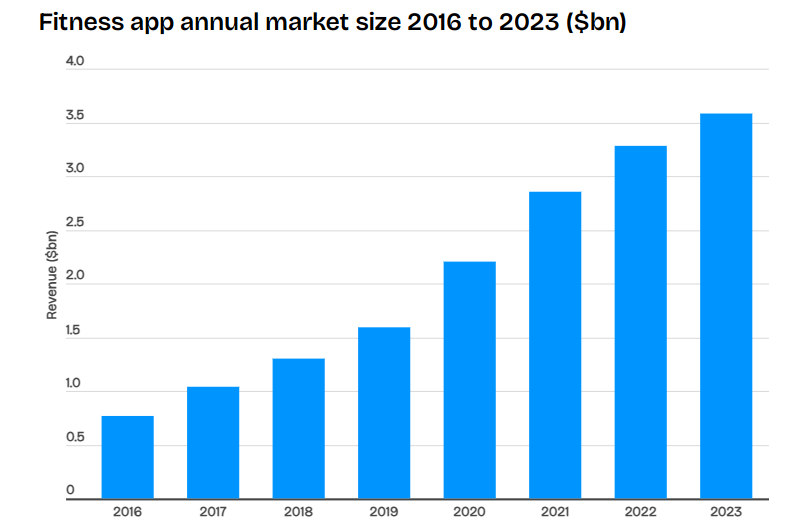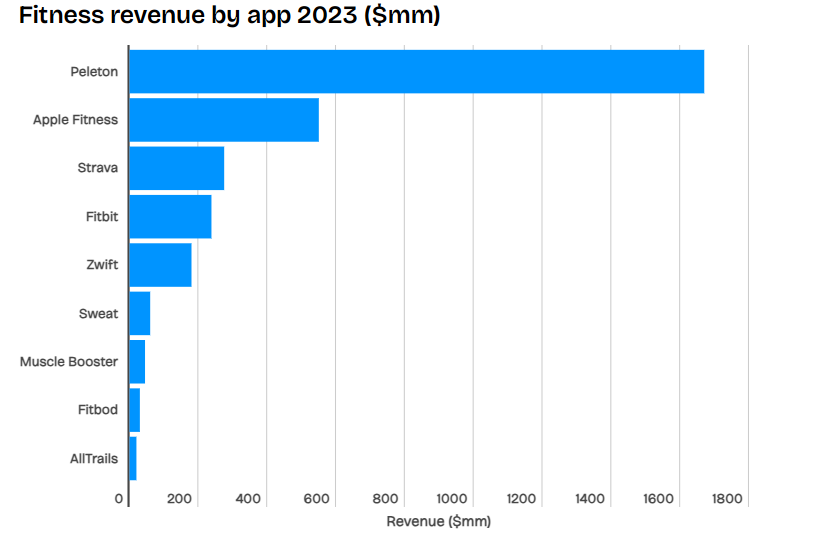Table of Contents
Introduction
According to Market.us, The Smart Fitness Apps Market is projected to experience substantial growth, aiming to reach USD 8.0 billion by 2033, from USD 2.1 billion in 2023, with a robust compound annual growth rate (CAGR) of 18.4% throughout the forecast period. These apps are digital platforms that leverage AI and wearable technology to offer personalized fitness tracking, diet recommendations, and mental health advice. They cater to the increasing global health consciousness, providing convenient solutions accessible through smartphones and wearables.
The market for smart fitness apps is experiencing significant growth as people increasingly embrace technology to track and improve their fitness and wellness goals. Smart fitness apps are mobile applications that utilize advanced technologies such as artificial intelligence, machine learning, and wearables to provide personalized fitness guidance, track activities, monitor health parameters, and offer various features for a comprehensive fitness experience.
Several factors contribute to the growth of the smart fitness apps market. Firstly, the rising awareness and importance of fitness and wellness among individuals have led to a surge in demand for tools that can assist in achieving health goals. Smart fitness apps provide convenience and flexibility by offering personalized workout plans, nutrition guidance, and real-time tracking of physical activities. These apps empower users to take control of their fitness journey, leading to increased adoption.

Despite the positive growth trends, the market faces several challenges. Data privacy and security concerns are significant issues, as these apps collect sensitive personal information. Ensuring the protection of user data is crucial to maintaining user trust. Another challenge is the high competition in the market, with numerous apps offering similar features, making it difficult for new entrants to establish a foothold.
Opportunities in the Smart Fitness Apps market are abundant. There is a growing trend of virtual fitness classes and remote training sessions, especially after the COVID-19 pandemic. This trend presents an excellent opportunity for app developers to introduce innovative features that cater to the needs of users who prefer to work out at home. Furthermore, collaborations with fitness influencers and partnerships with gyms and fitness centers can enhance app visibility and user engagement. The increasing adoption of wearable fitness devices also offers a potential market for integration, providing users with a seamless fitness tracking experience.
Key Takeaways
- The Global Smart Fitness Apps Market is projected to reach USD 8.0 billion by 2033, up from USD 2.1 billion in 2023, exhibiting a compound annual growth rate (CAGR) of 18.4% during the forecast period from 2024 to 2033.
- In 2023, the Workout & Exercise segment dominated the Smart Fitness Apps market, securing a share of over 28.4%.
- In 2023, the Android segment held a leading market position within the Smart Fitness Apps market, capturing more than 56.8% of the share.
- In 2023, North America held a dominant market position in the Smart Fitness Apps Market, capturing more than a 34.6% share, with revenues amounting to approximately USD 0.7 billion.
Smart Fitness Apps Statistics
- The Global Fitness App Market size is expected to reach USD 25.9 Billion by 2033, up from USD 4.9 Billion in 2023, growing at a robust CAGR of 18% during the forecast period from 2024 to 2033.
- In 2023, fitness apps generated USD 3.58 billion in revenue, marking a 9.1% increase from the previous year. Peloton led the market, generating the highest revenue through its Peloton App+.
- The number of fitness app users reached 368 million in 2023. Fitness apps were downloaded over 850 million times in the same year, a slight decrease from the 893 million downloads recorded in 2022.
- In terms of market share, Apple Fitness held the largest share at 29% in 2023, demonstrating its strong position and recent gains in the sector.
- Leap Fitness Group followed closely with a 22% share, indicating robust competition.
- Google Fit captured 15% of the market, while Fitbit held a 12% share.
- Welltech accounted for 4%, and the remaining 18% was occupied by other players in the market.
Fitness App Revenue
Despite a decline in usage and downloads, revenue increased in 2023 due to a higher number of users maintaining their subscriptions.

Source: businessofapps.com
Fitness Revenue by App
Peloton continues to lead the market in fitness subscription revenue. However, Apple has made significant progress over the past two years with its Fitness app, capturing a growing share of the market

Source: businessofapps.com
Emerging Trends
- Integration with Wearable Devices: The fusion of wearable technology with fitness apps is transforming how users track and analyze their health metrics. Wearables like fitness trackers and smartwatches provide real-time data on physical activity, sleep patterns, and vital signs, enhancing user engagement and personalization of fitness plans.
- Artificial Intelligence (AI) and Personalization: AI is increasingly being used to offer personalized workout routines and nutrition advice based on user data. By analyzing activity levels, preferences, and health metrics, AI-powered fitness apps can provide customized recommendations and adaptive workout plans.
- Holistic Wellness Approach: There is a growing emphasis on holistic well-being, integrating mental, emotional, and social health aspects. Fitness apps are expanding their features to include mindfulness, stress management, and sleep tracking to address overall wellness comprehensively.
- Immersive Virtual and Augmented Reality (VR/AR) Training: VR and AR technologies are making fitness routines more engaging by creating immersive workout environments. Users can participate in virtual workouts that simulate various scenarios, enhancing motivation and adherence to exercise regimens.
- Data Privacy and Security: As fitness apps collect extensive personal health data, there is increasing concern over data privacy. App developers are implementing stringent data protection measures, including encryption and user consent mechanisms, to comply with regulations and protect user information.
Top Use Cases of Smart Fitness Apps
- Personalized Workout Plans: Fitness apps provide customized workout routines tailored to individual fitness levels and goals. These plans can adapt based on user progress and feedback, ensuring effective and safe exercise regimens.
- Nutrition and Diet Tracking: Many fitness apps offer comprehensive tools for tracking dietary intake, including calorie counting, meal planning, and personalized diet recommendations. This helps users make healthier food choices and manage their nutrition effectively.
- Virtual Fitness Classes: The convenience of virtual fitness classes allows users to participate in live-streamed or on-demand workouts from home. These classes range from yoga and Pilates to high-intensity interval training (HIIT), providing flexibility and accessibility to diverse exercise options.
- Mental Health and Mindfulness: Fitness apps are incorporating features for mental well-being, such as meditation, stress reduction, and sleep improvement tools. Apps like Headspace and Calm have become popular for their comprehensive approach to mental health.
- Chronic Disease Management: Fitness apps are increasingly used to support individuals with chronic health conditions by facilitating constant contact with healthcare providers and offering tailored exercise and diet plans. This is particularly beneficial for managing conditions like diabetes and cardiovascular diseases.
Major Challenges
- User Engagement and Retention: Many fitness apps struggle to keep users engaged over time. High competition with overlapping features among apps can lead to user attrition.
- Data Privacy Concerns: Users are increasingly wary of how their personal health data is handled. Ensuring robust data security measures is critical to maintain user trust and comply with stringent regulations.
- Hardware Dependency: Many fitness apps rely heavily on smartphone and wearable technology compatibility. Issues with device connectivity or limited access to affordable smart devices can restrict user adoption.
- Market Saturation: The fitness app market is highly saturated with numerous apps offering similar functionalities. Differentiating products in a crowded market is a significant challenge.
- Technological Integration and Updates: Keeping up with rapid advancements in technology and integrating new features like AI and machine learning for personalized experiences requires continuous development, which can be resource-intensive.
Market Opportunities
- Rising Health Awareness: Increasing awareness and emphasis on health and fitness across global populations present a growing demand for fitness apps.
- Integration with Wearable Devices: As the adoption of wearable technology grows, fitness apps that offer seamless integration with these devices can capture a larger market share.
- Expansion into Emerging Markets: Developing regions with increasing smartphone penetration and improving internet access provide new opportunities for market expansion.
- Corporate Wellness Programs: Businesses are increasingly investing in employee health, opening opportunities for fitness apps tailored for corporate wellness programs.
- Customization and Personalization: Offering personalized fitness and health plans using AI can help apps stand out and improve user engagement and satisfaction.
Recent Developments
- Smart Fitness App Launch – In January 2024, Smart Fitness launched a new app version with enhanced AI-driven personalized training programs and integration with leading wearable devices to provide real-time fitness tracking and analytics.
- Kaia Acquisition – In February 2024, Kaia Health acquired another health-tech startup to expand its portfolio of digital therapy solutions, particularly focusing on integrating mental health and physical fitness for a holistic approach to well-being
- Freeletics Funding Round – In April 2023, Freeletics secured $50 million in a Series C funding round to enhance its AI capabilities and expand its global reach. The funds are aimed at developing new interactive features and expanding their community-based fitness programs.
- Partnership with Fitbit – In March 2023, Sakar International entered into a strategic partnership with Fitbit to co-develop a new line of fitness tracking devices and companion apps aimed at improving user engagement through innovative features and user-friendly interfaces.
- New Product Launch – In November 2023, Abvio launched a new suite of fitness apps with advanced GPS tracking and social sharing features, aimed at enhancing user experience and community engagement.
- Merger with FitnessKeeper – In January 2023, Digifit announced a merger with FitnessKeeper to create a comprehensive fitness platform combining robust tracking capabilities with personalized workout plans and nutrition advice.
- Fitbit by Google Integration – In June 2023, Fitbit announced deeper integration with Google Health to leverage Google’s AI and machine learning capabilities, aiming to provide more accurate health insights and personalized fitness recommendations.
- Feature Expansion – In August 2023, Map My Run expanded its feature set to include more detailed route planning and real-time coaching, enhancing its usability for both amateur and professional runners.
Conclusion
In conclusion, the smart fitness apps market is witnessing impressive growth due to the increasing demand for personalized fitness solutions and advancements in wearable technology. However, challenges related to interoperability and data security need to be addressed. The integration of AI and machine learning offers opportunities for enhanced user experiences and personalized fitness guidance. With the potential to transform the way people approach fitness, smart fitness apps have a promising future in the wellness industry.
Discuss your needs with our analyst
Please share your requirements with more details so our analyst can check if they can solve your problem(s)



